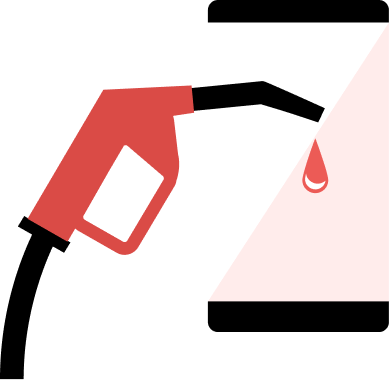- Fuel Delivery Apps in UAE: A Market Overview
- How Does CAFU Work?
- Must-Have Features of a Fuel Delivery App Like CAFU
- Cost Blueprint for On-Demand Fuel Delivery App Development
- Cost Estimation Based on App Scope & Complexity Level
- Cost Estimation by Development Stages
- Time & Team Estimation Based on App Scope
- Factors Influencing the Cost of Fuel Delivery Apps like CAFU
- Choice of Platform
- UI/UX Aspects
- Testing Needs
- Third-Party Integrations
- Security Measures
- Compliance Measures
- Hidden Costs of Fuel Delivery App Development
- Ongoing Maintenance and Upgrades
- Scalable Cloud Hosting Infrastructure
- Marketing, User Acquisition & ASO
- Legal, Regulatory & Licensing Requirements
- Cost-Saving Strategies for Developing a CAFU-Style Fuel Delivery App
- Launch with an MVP Approach
- Focus on Essential Features First
- Choose Cross-Platform Frameworks
- Outsource to Experienced Global Teams
- Required Technology Stack for an On-Demand Fuel Delivery App Like CAFU
- How to Develop a Fuel Delivery App Like CAFU?
- Step 1: Strategize a Business Model
- Step 2: Get a License
- Step 3: Get Your Trucks and Fuel Vehicles
- Step 4: Partner with Fuel Businesses
- Step 5: Develop Your Fuel Delivery App
- Step 6: Engage and Retain Clients
- Step 7: Analytics and Report
- How to Build a Fuel Delivery App That Beats CAFU at Its Own Game
- Smarter Route Optimization for Faster Deliveries
- AI-Driven Personalization
- Advanced Safety & Compliance Features
- How Does the CAFU App Make Money?
- Bulk Purchases
- Advertising Opportunities
- Value-Added Services
- On-Demand Fuel Delivery
- Subscription Plans
- Launch Your On-Demand Fuel Delivery Solution with Appinventiv Dubai
- FAQs
Imagine you are sitting in traffic with little gasoline. You immediately click on the fuel delivery app and receive the fuel directly in your car without the discomfort of stopping at the gas station.
This isn’t a far-off concept—it’s the real-world impact of fuel-delivery apps like CAFU, which are transforming the on-demand fuel industry with convenience, speed, and modern technology.
With the UAE consuming over 1.139 million barrels of oil daily and advancing its smart city initiatives, there’s a notable shift toward convenience-driven solutions (Source: YCharts). This trend is evident in the rise of on-demand fuel delivery services, such as CAFU, which cater to the modern consumer’s preference for time-saving and efficient services.
If you own a company or are an entrepreneur dreaming of launching your fuel delivery app to capitalize on this wave, you probably wonder, “How much will this cost me?”
Developing an app similar to CAFU involves several considerations for entrepreneurs and businesses looking to enter this burgeoning market. The estimated cost to build such an app ranges from AED 150,000 to AED 300,000 ($40,000 to $250,000), depending on factors like platform choice, feature complexity, UI/UX design, and the development team’s location.
Investing in an on-demand fuel delivery app aligns with the UAE’s trajectory toward digital transformation. It offers a promising opportunity to meet the evolving needs of consumers seeking convenience and efficiency in their daily lives.
Let us dive into every detail of the development process that will not only help you decide on the structure of your application but will also provide you with a rough estimate of the fuel delivery app development cost.
Launch your smart fuel app now and stay ahead in the mobile-first economy.
Fuel Delivery Apps in UAE: A Market Overview
The global on-demand fuel delivery market is projected to reach about $2.37 billion by 2033, growing at a compound annual growth rate of 15.97% (Source: Business Research Insights). This growth is attributed to the rising number of vehicles on the road, increased urbanization, government investments in infrastructure, and the growing demand for convenient, tech-enabled fuel solutions like CAFU’s on-demand fuel delivery services.
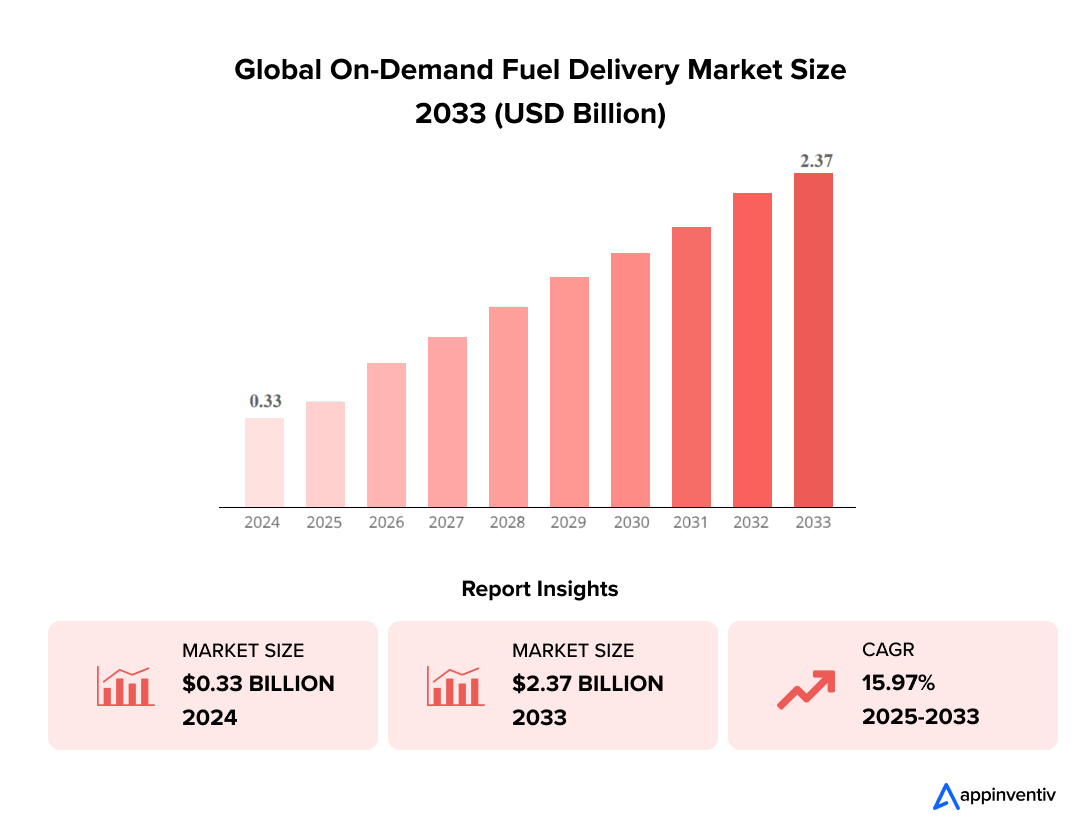
Innovations like compact, relocatable fuel stations and AI-powered personalization by key industry players enhance customer experience, boosting market growth. Government investments in smart infrastructure and public-private partnerships are also propelling expansion. Additionally, increasing demand from the logistics and delivery sectors is adding momentum to market growth.
How Does CAFU Work?
As a fuel delivery app in Dubai, CAFU stands out as a pioneering solution that lets users refuel their vehicles without the need to visit a gas station. With just a few taps on iOS or Android, users can register, share their parked location, and have fuel delivered directly to their vehicle. A CAFU pilot then arrives to refuel the car, following all necessary safety protocols.
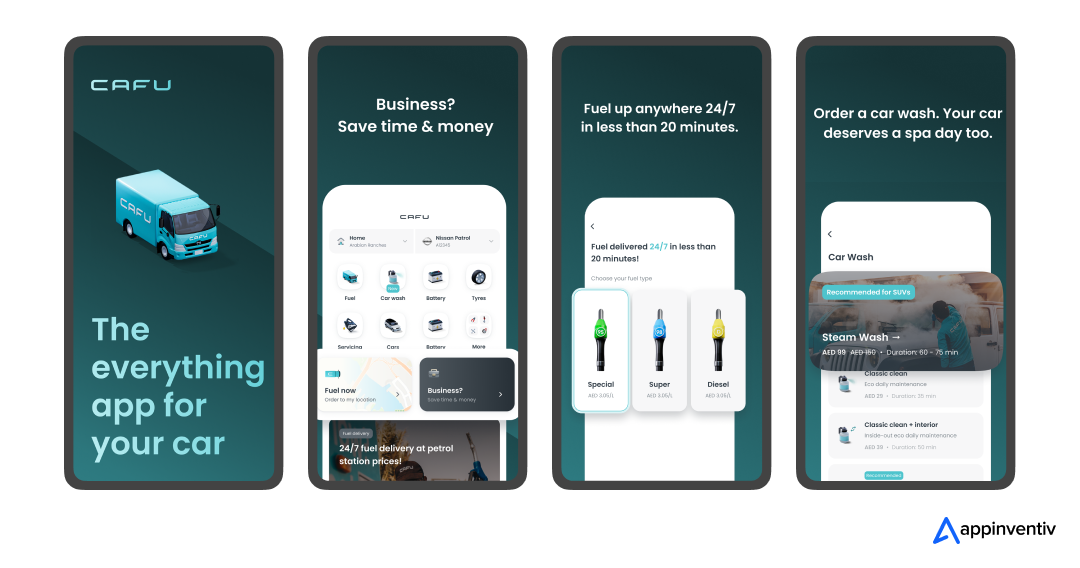
Beyond fuel delivery, CAFU offers additional doorstep services such as engine oil changes, battery replacements, car washes, and tire services. Its seamless user experience, time-saving convenience, and commitment to innovation have made it a favorite among car owners across Dubai and beyond. For businesses or entrepreneurs inspired by its success, developing an app like CAFU presents a promising opportunity to tap into the growing on-demand service economy.
Must-Have Features of a Fuel Delivery App Like CAFU
If you want to make an app similar to CAFU, the key to ensuring its success is integrating high-quality, user-centric features that elevate functionality, convenience, and overall user experience. Some of the top features are listed below as per its various panels. However, it is important to note that each panel can be integrated with more advanced features that would further raise the overall fuel delivery app development cost:
| User Panel | Delivery Panel | Admin Panel |
|---|---|---|
| User registration & login | Driver login & profile management | Centralized admin dashboard |
| Real-time fuel ordering | Receive new order notifications | Manage users and drivers |
| GPS location auto-detection | Optimized navigation via integrated maps | Monitor and manage fuel inventory |
| Fuel type & quantity selection | Update delivery status (accepted, delivered) | Track orders and delivery status |
| Schedule delivery (now/later) | Daily earnings summary | Generate analytics and performance reports |
| Multiple payment methods | Route optimization for multiple deliveries | Manage promotions and discount codes |
| View order history | In-app chat with users and support | Handle payments and commission structure |
| Push notifications | Access to the delivery schedule/calendar | Set fuel pricing and app settings |
| Rate and review services | Digital proof of delivery (signature/photo upload) | Ensure compliance and safety logs |
| In-app customer support/chat | Emergency contact or support access | Manage delivery zones and coverage areas |
Cost Blueprint for On-Demand Fuel Delivery App Development
The overall cost to build a fuel delivery app like CAFU depends on factors like app complexity, service coverage, tech stack, third-party integrations, and the level of automation. Here’s a clear breakdown of the effort, timelines, and budget you can expect when building a high-performance app like CAFU.
Cost Estimation Based on App Scope & Complexity Level
The fuel delivery app development cost largely hinges on the app’s feature depth and system architecture. Whether you’re building a basic fuel delivery application or a high-performance solution with real-time tracking and integrated vehicle services, the cost structure varies. Here’s a breakdown based on complexity:
| App Complexity | Estimated Cost (USD) | Estimated Cost (AED) | Key Features |
|---|---|---|---|
| Basic Version | $40,000 – $80,000 | AED 150,000 – AED 295,000 | Location pinning, fuel order, user profiles, and basic admin panel |
| Mid-Level App | $80,000 – $150,000 | AED 295,000 – AED 550,000 | Real-time driver tracking, customer support, and order history |
| Advanced Platform | $150,000 – $250,000+ | AED 550,000 – AED 920,000+ | AI-driven logistics, multi-service modules (wash, oil, battery), fleet analytics, smart notifications |
Cost Estimation by Development Stages
Understanding the on-demand fuel delivery app development cost requires a deep dive into the phases that bring the app to life. Each development stage, from discovery to post-launch maintenance, adds time and resource allocation layers.
| Development Stage | Cost Contribution | Key Deliverables |
| Discovery & Planning | 5% – 8% | Competitor benchmarking, feature roadmap, and legal compliance |
| UI/UX Design | 10% – 15% | App wireframes, journey mapping, interactive prototypes |
| Core Development | 50% – 60% | User app, driver app, admin dashboard, backend & APIs |
| QA & Testing | 10% – 12% | Bug tracking, load testing, and security validations |
| Launch & Go-live | 5% – 8% | App deployment, DevOps setup, and store submission |
| Ongoing Support | 15% – 20% annually | Feature updates, server maintenance, analytics & optimization |
Time & Team Estimation Based on App Scope
Timelines and team composition are pivotal in shaping your total CAFU app development cost. Larger and more sophisticated apps require specialized resources, leading to longer cycles and higher investments.
| Development Stage | Timeline | Team Composition | Ideal Use Case |
|---|---|---|---|
| Ignition Mode (Basic MVP) | 3–5 months | – 1 Product Strategist – 1 Backend Dev – 1 Mobile App Dev – 1 UI Designer – 1 QA Tester | Testing the waters with a lean, functional MVP in a small market. Perfect to validate demand and raise funding. |
| Fuel Efficiency Mode (Mid-Level App) | 6–9 months | – 1 Project Manager – 2–3 Mobile Developers (iOS/Android) – 1 UI/UX Expert – 1 Backend Developer – 2 QA Engineers | A feature-rich fuel delivery app optimized for local scale, real-time tracking, and integrated payment systems. |
| Turbocharged Mode (Enterprise App) | 9–14+ months | – 1 CTO/Tech Architect – 3–4 Full Stack Developers – 1 DevOps Engineer – 1–2 AI/ML Engineers – 2 UI/UX Designers – 2 QA Engineers – 1 Cybersecurity Analyst – 1 Support Lead | This is for companies aiming for regional or national dominance with smart routing, predictive fuel demand, subscription models, and high-end scalability. |
Factors Influencing the Cost of Fuel Delivery Apps like CAFU
An app development team cannot immediately give you the accurate app development cost. They would first study the requirements of your mobile fuel delivery app and then share a rough estimate of your app development cost and the time needed to build it. Here are some of the influential factors that can affect your CAFU app development cost.
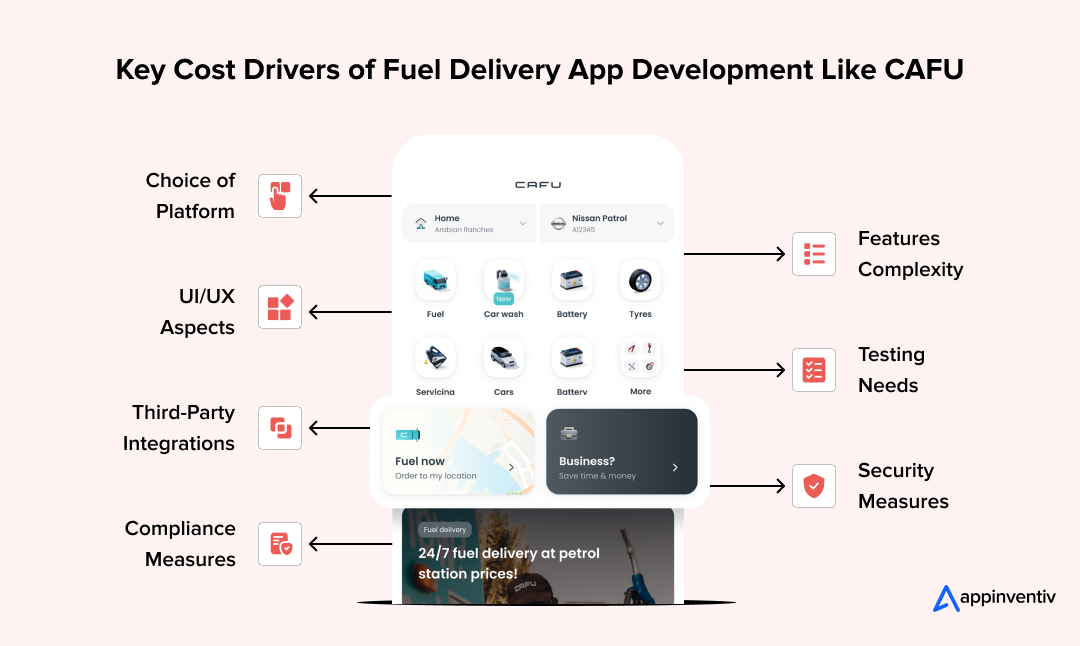
Choice of Platform
Choosing your platform is another factor influencing your app development cost. You must select the right platform for your mobile gas app development. Your fuel app must function exceptionally well on this platform. You must also determine whether to build your app on a single platform or a cross-platform app.
A fuel delivery app should include scheduling, ordering, tracking, payments, and GPS features. Your delivery agents need dashboards, metrics, routes, requests, and notifications. Also, consider the features your customers would need. Naturally, it costs a lot more to design and create more advanced features, like fuel specifications, location pinning, multiple payment options, order history, billing, and price comparison.
UI/UX Aspects
Graphics, menus, colors, animation, and other UI aspects can build a positive customer experience. Interactions, widgets, call-to-actions, etc., can also improve the client experience. Your app must grasp users’ attention with exciting features to entice them to place an order.
Testing Needs
The expenditures associated with the waterfall, RAD, and agile development methodologies are variable. Testing some sophisticated apps can cost up to AED 18,500 ($5,000).
Third-Party Integrations
Enhancing your fuel delivery app with third-party services, such as payment processors (e.g., Stripe, PayPal), social media platforms for login or marketing, and GPS navigation systems, can significantly elevate its functionality. However, these integrations come with varying levels of complexity and may extend development timelines and introduce recurring maintenance costs.
Security Measures
Since fuel delivery apps manage sensitive data such as user locations and payment details, implementing advanced security measures is non-negotiable. Features like end-to-end encryption, secure authentication methods (e.g., OAuth, biometric logins), and protection against cyber threats are essential. While these measures fortify user trust and data safety, they also add to the overall development expenditure.
Compliance Measures
Your app must comply with applicable regulations to operate legally and ethically across different regions. This includes data protection frameworks, fuel handling safety standards, and transportation laws. Achieving full compliance often demands expert legal guidance and tailored development efforts, which can influence the app’s final cost.
Now that we have examined the fuel delivery app development costs and factors affecting them, let’s discuss the features that must be included in a CAFU-like fuel delivery app.
Hidden Costs of Fuel Delivery App Development
While creating an on-demand fuel delivery app like CAFU, the visible elements—sleek UI, GPS tracking, and secure payments grab attention. But behind the curtain, critical backend costs play a major role in sustaining performance, user satisfaction, and regulatory alignment.
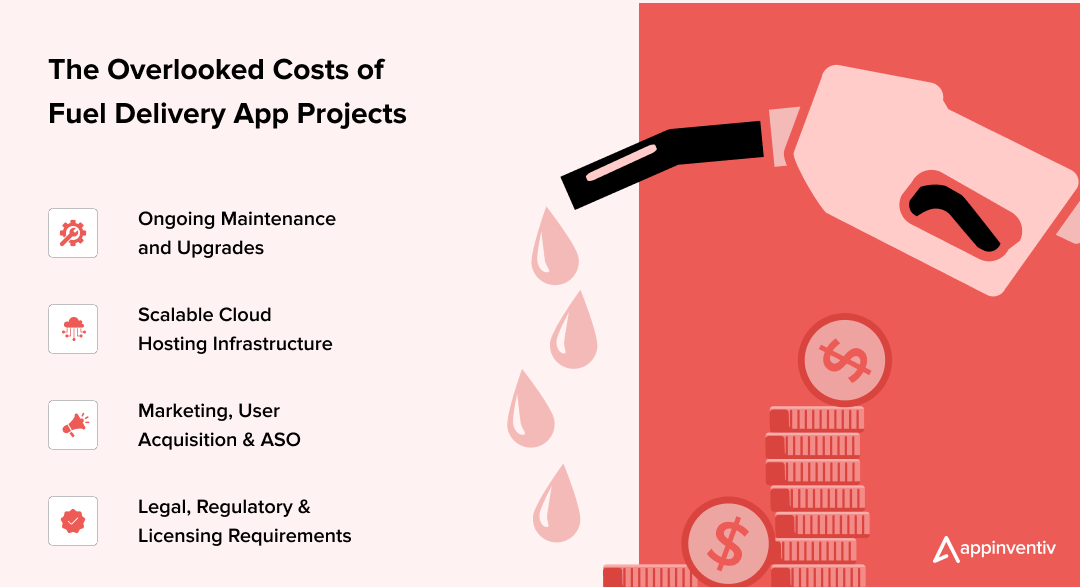
Ongoing Maintenance and Upgrades
One of the most underestimated aspects of fuel delivery app development cost is post-launch support. Regular updates, performance optimization, and technical troubleshooting are vital to ensure consistent functionality and a frictionless user experience across all devices and platforms.
Scalable Cloud Hosting Infrastructure
Factoring in the CAFU app development cost isn’t complete without accounting for hosting. Real-time service apps like CAFU require cloud infrastructure to manage dynamic location tracking, secure transactions, and high-volume traffic, demanding reliable uptime and scalability.
Marketing, User Acquisition & ASO
Marketing is a must-have when calculating the cost to build a fuel delivery app like CAFU. From paid campaigns and content creation to app store optimization (ASO), building awareness and user trust takes time, strategy, and consistent budget allocation.
Legal, Regulatory & Licensing Requirements
Complying with local fuel transport regulations, business licensing, and safety protocols is a key element of the on-demand fuel delivery app development cost. Legal consultations, certifications, and documentation are essential to operating within the law and earning customer confidence.
Cost-Saving Strategies for Developing a CAFU-Style Fuel Delivery App
Building a powerful on-demand solution like the CAFU fuel delivery app doesn’t have to break the bank. With smart planning and the right development approach, you can launch a high-quality product without overspending. Here’s how to reduce costs effectively:
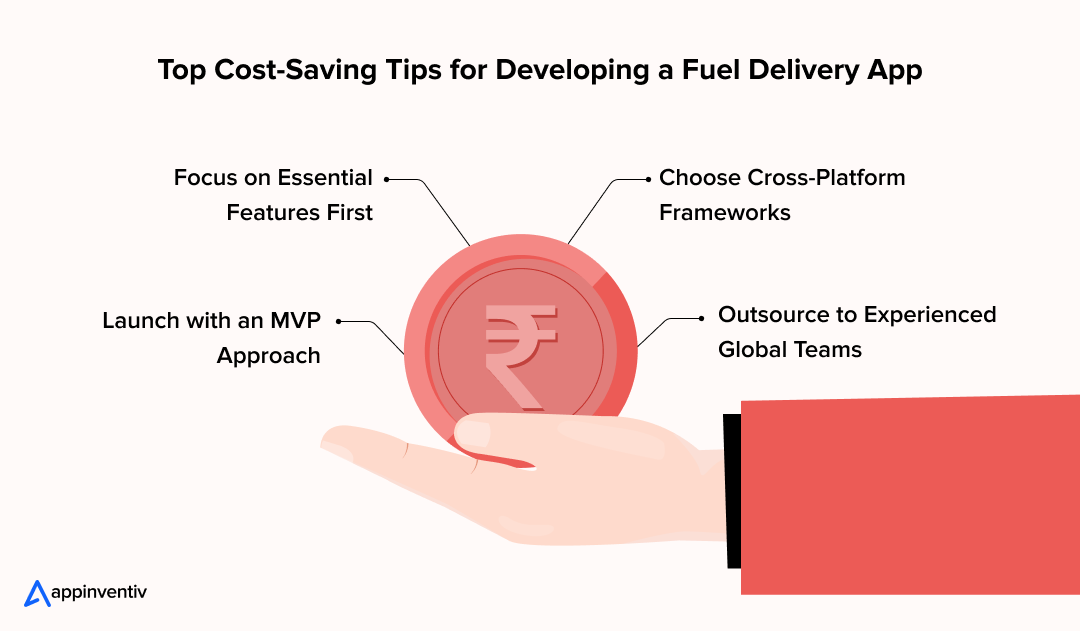
Launch with an MVP Approach
Developing a Minimum Viable Product helps validate your idea with core features like fuel ordering, location tracking, and seamless payments. This strategic move is perfect for anyone planning app development like CAFU, as it limits upfront costs while gathering user feedback for future iterations.
An MVP accelerates time-to-market, helping you test real-world traction before going full scale. It ensures you prioritize features that truly resonate with users, allowing you manage and optimize the fuel delivery app development cost.
Focus on Essential Features First
Avoid feature overload by prioritizing what matters most to your users. Concentrate on functionalities that drive usage and retention, such as scheduling, notifications, and secure payment integration. This helps streamline resources when you create an app like CAFU without unnecessary expenses.
Feature prioritization also prevents development delays, simplifies future updates, and improves scalability. It enables efficient budgeting and better resource allocation.
Choose Cross-Platform Frameworks
Developing with cross-platform technologies like Flutter or React Native ensures faster time to market and broader device compatibility. This method reduces the workload and cost of a CAFU clone using a single codebase for both iOS and Android platforms.
Cross-platform development simplifies maintenance and allows for unified updates, reducing long-term overhead. It improves team efficiency while maximizing market reach.
Outsource to Experienced Global Teams
Outsourcing your project to a dedicated development team can help you skillfully allocate your expenses. Outsourcing smartly ensures you get quality results within budget, making your investment in a CAFU fuel delivery app far more scalable and sustainable.
To minimize risk, look for partners with industry expertise and strong portfolios. Outsourcing also allows you to scale your team based on evolving needs.
Also Read: How to Outsource App Development in 2025
Required Technology Stack for an On-Demand Fuel Delivery App Like CAFU
Creating an on-demand fuel delivery app might be slightly challenging, but doing so with the appropriate technology is a major concern. It is crucial that your app is supported by the appropriate technology if you want it to be successful and remain competitive in the market for the foreseeable future. You must ensure that your fuel delivery app development team uses the right tools and technology.

How to Develop a Fuel Delivery App Like CAFU?
To build a high-performing fuel delivery app like CAFU, it’s essential to understand the business model, target audience, and must-have features that drive user engagement. Here’s a breakdown of the key steps to follow for successful app development like CAFU:
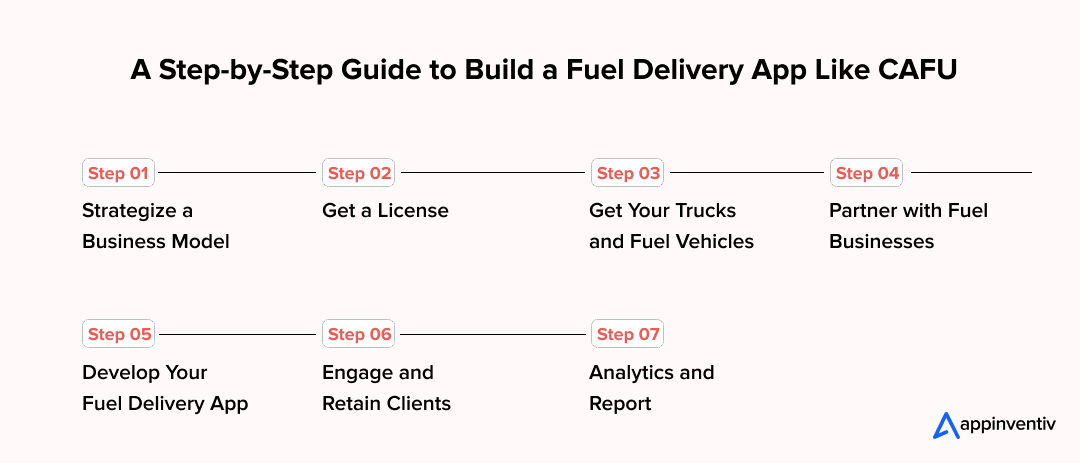
Step 1: Strategize a Business Model
You must thoroughly consider all types of business models and see which one will be best suitable for your design.
Think about a few company models:
Aggregators
Aggregators are online platforms that link users with oil and gas software development company that specialize in providing digital solutions for the energy sector.
Bonus Read: AI in the UAE Energy Sector: Explore Why & How
Delivery services
According to this model, fuel/gas delivery startups operate as separate commercial organizations that provide fuel to their customers. There will be different types of organizational infrastructures.
Step 2: Get a License
The laws and regulations of a specific nation govern the oil and gas business. Before starting your business, make sure to check the legal requirements and abide by them. If you require help navigating the complexities of your local legislation, consider hiring an attorney.
Step 3: Get Your Trucks and Fuel Vehicles
To distribute fuel and gas to customers, you will require specialized vehicles. They should all be outfitted with GPS navigation systems and be capable of transporting the particular fuel types you intend to sell. Licensed drivers should only operate these vehicles.
Step 4: Partner with Fuel Businesses
Your next move is to create alliances with local gas and fuel suppliers. Contact retail businesses and gas station owners to increase sales and expand clientele to see if they’d be open to partnering with a fuel delivery service.
Step 5: Develop Your Fuel Delivery App
After finalizing the tech stack and features, the next step is to build a robust software solution with the help of a trusted fuel delivery app development company like Appinventiv. The backend architecture is carefully engineered with clean code, secure APIs, and system integrations to ensure seamless communication between devices, databases, and third-party services.
Once the backend is in place, the app components function cohesively—delivering a unified and efficient fuel delivery experience.
Step 6: Engage and Retain Clients
Now, you need to market your service and draw in new customers. Before you complete the last phases of application development, launch the promotion campaign. This will allow you to build a community of early users around your app, and after they’ve provided feedback, test it for user approval.
Step 7: Analytics and Report
Leveraging complete data insights is key to consistently enhancing your service quality and product performance, helping you stand out in a competitive fuel delivery market. Monitoring critical parameters like fuel quantity, purity, and carrier temperature during delivery ensures reliability and trust. By integrating advanced technologies such as the Internet of Things (IoT), you can track these metrics in real time and make data-driven improvements to your operations.
You will be able to scale your business as it expands to serve even more user groups and market areas.
How to Build a Fuel Delivery App That Beats CAFU at Its Own Game
Building a fuel delivery app like CAFU is just the starting point; beating it means innovating beyond what’s already out there. With rising demand for on-demand convenience and fuel accessibility, there’s a massive opportunity to lead the market. Here’s how you can outperform an app like CAFU.
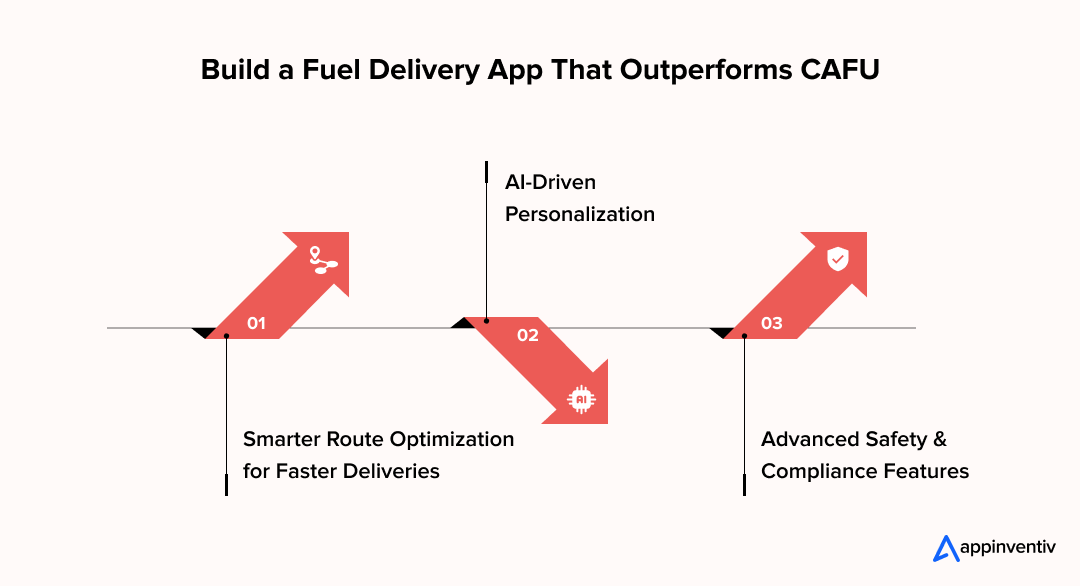
Smarter Route Optimization for Faster Deliveries
Leverage real-time traffic data and AI-powered routing to ensure timely fuel deliveries, reduce delays, and optimize operational efficiency. This saves on delivery costs and enhances driver productivity and customer satisfaction. It’s a must-have to scale operations seamlessly across cities and zones.
AI-Driven Personalization
Using AI-powered insights, deliver custom offers, schedule suggestions, and intelligent fuel consumption tips. Tailoring the experience makes users feel understood and more likely to stay loyal. You also unlock upselling opportunities based on driving patterns.
Advanced Safety & Compliance Features
Incorporate safety checklists, digital signatures, and real-time compliance alerts for secure, lawful fuel transport. These protocols reduce risk, build credibility, and align with regulatory requirements, although they influence the overall fuel delivery app development cost. This is especially critical when scaling across regions with different fuel transport laws.
How Does the CAFU App Make Money?
The CAFU app generates revenue through several innovative channels that enhance user convenience and engagement. Here are the main ways it monetizes its services, addressing the question ‘What is the business model of CAFU?’:
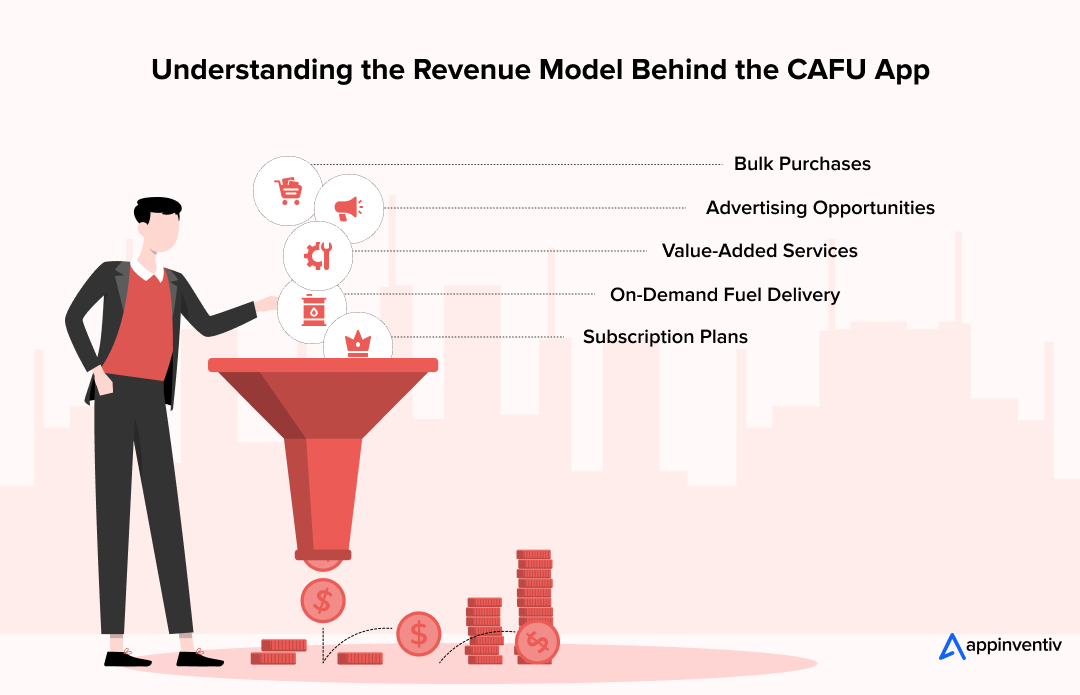
Bulk Purchases
The app partners with businesses for bulk fuel purchases, presenting significant revenue opportunities. Companies often prefer this option for efficiency and cost savings, benefiting CAFU and its clients.
Advertising Opportunities
By integrating advertisements from related services or products within the app, CAFU can generate additional income without increasing costs for users. This creates a win-win scenario for both advertisers and customers.
Value-Added Services
Gas delivery apps like CAFU may broaden their offerings to include services like vehicle maintenance or car washes. This service attracts busy individuals who appreciate time-saving solutions and are willing to pay for the added convenience, contributing significantly to CAFU’s profit margins.
On-Demand Fuel Delivery
Customers pay a premium for the convenience of fuel delivered directly to their location. This service attracts busy individuals who appreciate time-saving solutions and are willing to pay for the added convenience.
Subscription Plans
CAFU offers subscription services that enable regular customers to receive fuel delivery at discounted rates or with added benefits. This approach creates a consistent revenue stream and builds customer loyalty.
Also Read: How Do Apps Make Money: Strategies to Boost Your Revenue Potential
Launch Your On-Demand Fuel Delivery Solution with Appinventiv Dubai
Fuel delivery is becoming an essential convenience across the UAE, with users expecting seamless service, real-time tracking, and digital ease at their fingertips. To meet these expectations and stay competitive, businesses must go beyond basic functionality and invest in technology that delivers intelligence, reliability, and scalability.
At Appinventiv, we’ve partnered with global enterprises and Fortune 500 companies to build digital solutions that drive real results. As a trusted mobile app development company in Abu Dhabi, Dubai, and Kuwait, we specialize in creating tailored, end-to-end fuel delivery applications designed around your business model and customer needs.
Our products are backed by research, precision design, and future-ready development practices. We also integrate advanced technologies into your fuel delivery applications to give you clear visibility into user behavior, operational trends, and performance metrics, enabling better decision-making and ongoing optimization.
If your goal is to enhance efficiency, elevate customer experience, and scale smartly, our on-demand app development services are built to make that happen.
Let’s build a solution that fuels more than just vehicles—it fuels business success.
FAQs
Q. How long does it take to develop an app like CAFU?
A. The time it would take to create an app similar to CAFU mostly depends on the precise requirements and specifications you provide. In general, it would take our mobile application development team at least 10 to 12 weeks to deliver your fuel delivery app.
Q. What is an on-demand fuel delivery service?
A. An on-demand fuel delivery service brings fuel directly to your vehicle whenever it needs refueling, eliminating the hassle of driving to a gas station and waiting in line. Once you’re registered with a fuel delivery app, all you need to do is pin your location, select your preferred fuel type, choose a payment method, and place the order.
A fuel truck will arrive at your location and refill your vehicle’s tank, with the payment automatically deducted from your linked account, offering a seamless, time-saving refueling experience.
Q. What is the cost of building a fuel delivery app like CAFU?
A. The cost of creating an app similar to CAFU relies on a number of variables, including the complexity of the app, UI/UX design, platform choice, and others. On-demand fuel delivery apps do, however, cost between AED 150,000 to AED 300,000 ($40,000 to $250,000), depending on the features you utilize. To get a detailed breakdown of the total fuel delivery app development cost, connect with our experts today.


- In just 2 mins you will get a response
- Your idea is 100% protected by our Non Disclosure Agreement.

How Much Does It Cost to Build a Job Portal like Bayt?
In a landscape rife with challenges, the job industry struggles with issues such as skills shortages, fierce competition, and the ever-changing demands of the market. However, the emergence of platforms like Bayt has provided a lifeline for businesses. Bayt transcends the limitations of traditional recruitment by providing businesses with an innovative talent pool. Leveraging advanced…
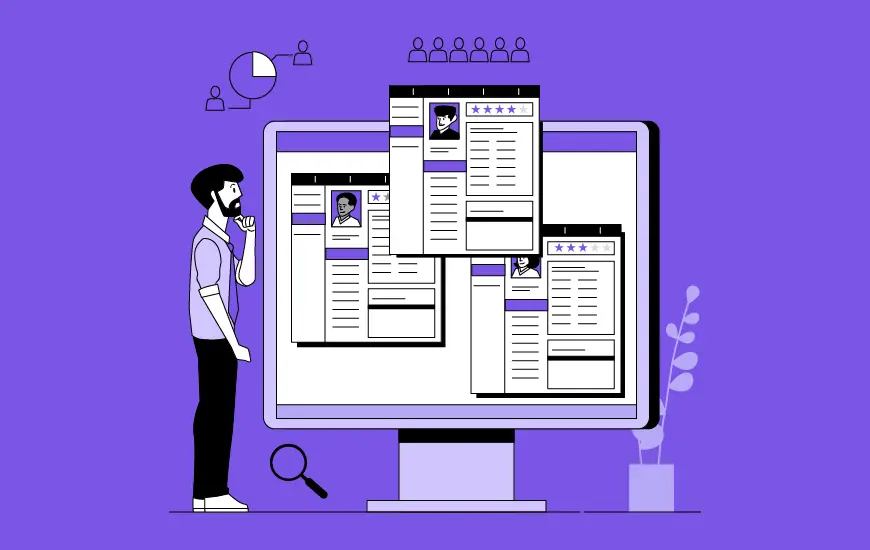
How Much Does It Cost to Build a Job Portal like Glassdoor?
In the wake of the COVID-19 pandemic, the recruiting industry saw a dramatic change. It has caused many organizations to lose their projects and businesses to shut down, causing many employees to lose their job roles worldwide. In such a scenario finding a suitable job or recruiting the right talent has become one of the…
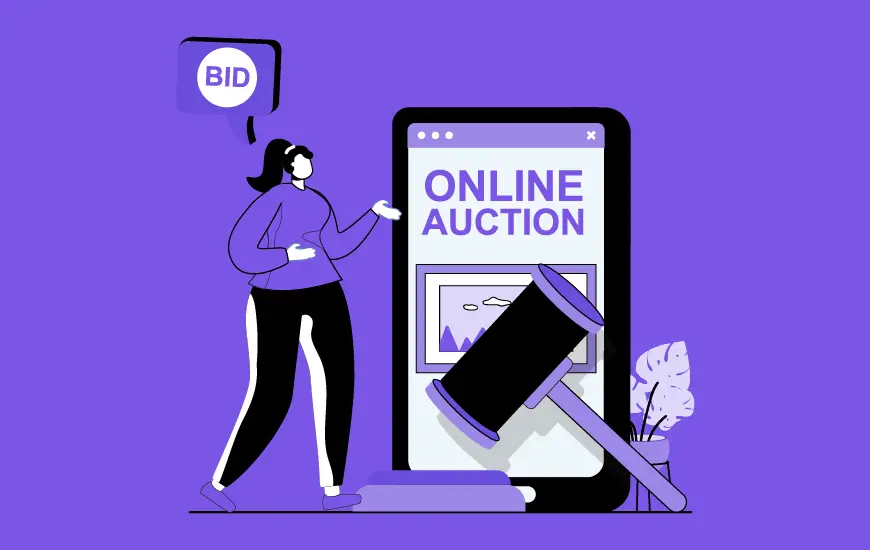
How to build an online auction application? Benefits, features, costs
When was the last time you went street shopping and bargained with the vendor to sell their products at a lower price? If you remember that experience, imagine bringing it on a digital platform in a more sophisticated way. Websites and applications like Ebay, BidSpotter, and Auction.com, etc. have been making it easy for the…







